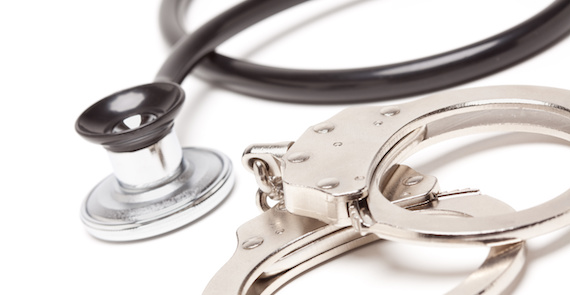Police Misconduct Through the Unequal Application of the Law
October 4, 2017

The recent arrest of a courageous nurse at the University of Utah as she refused to allow a police officer to draw blood from an unconscious patient without a warrant offers some important lessons about preparing for interactions with police, whether they are investigating you or one of your patients.
A detective with the Salt Lake City Police Department insisted the hospital draw a blood sample on an unconscious patient who was injured when a suspect, who was being chased by police, struck his truck. The nurse correctly explained that absent the patient’s consent, a warrant or the patient being under arrest, it would be improper for the hospital to comply with the officer’s demand.
Nurse Alex Wubbels has expressed dismay that U. police and security did not protect her before Detective Jeff Payne arrested her. Investigative reports released Wednesday — including a Salt Lake City Police Department internal affairs report and another prepared by the city’s independent Civilian Review Board — also single out U. officers and security for not trying to defuse the situation.
When a U. officer arrived on scene, Wubbels asked him to protect her because Payne had threatened her with arrest, acting on orders from his watch commander, Lt. James Tracy.
“For his part, the University of Utah Police Officer informed Ms. Wubbels that, if she interfered with [Payne‘s] investigation, she would be obstructing justice and he would not prevent you from arresting her,” according to Payne’s internal affairs report.
U. security officers, which also fall under the Brophy-led Department of Public Safety, told Wubbels the situation was a “police matter” and they couldn‘t “get involved,” the internal affairs report states.
According to bodycam footage, as Payne moves to arrest Wubbels — grabbing and chasing her — she screams and backs into the U. police officer, who places a hand on Wubbels’ shoulder, apparently assisting Payne. (Other hospital employees appear to try and talk Payne down as the arrest is taking place.)
Hiring a Medical Expert Witness? Get tips on how to select the right medical expert to build your winning case with our FREE ebook.
Later, as Wubbels sits in Payne’s squad car, the same U. officer, identified in police reports as Steven Worona, approaches Payne and Tracy, telling them he may be able to help obtain the blood.
“We know this guy’s on burn [unit] right? I can get you guys up to burn, then we can weasel around from there and try to figure it out up there, if you guys are open to that idea,” he tells the Salt Lake City officers.
Payne indicates he is open to trying that. But Tracy then says such a maneuver isn’t necessary, that they will direct Logan police, the agency which requested the blood draw, to get the blood using a warrant.
The investigative reports say a third SLCPD officer dispatched to the scene, Denton Harper, also failed to try and de-escalate the situation.
“[Harper] failed to intervene, to ‘save’ [Payne] from his increasing pique …” the Civilian Review Board report states. “The U of U Police did not intervene to calm down [Payne], and as expected, the private hospital security staff were nothing more than observers. In other words, not one officer or security officer intervened with the escalating [Payne], and apparently, none of them knew the law any better than [Payne] did.”
This episode leaves many questions.
Is this a unique situation or standard operating procedure for law enforcement?
Why didn’t the University police order Payne off the premises and tell him to return with a warrant?
What would be the consequences of this situation if a citizen attempted to ignore the law and ignore the rights of another? Will the officers involved face these same consequences?
This birds eye view of police harassment is very disconcerting and contributes to the erosion of public confidence in our police. Unequal application of the law cannot be tolerated. No person or entity is too powerful to be held accountable. This must be reflected in the outcome of this case.

